New Mars Forums
You are not logged in.
- Topics: Active | Unanswered
Announcement
#51 2013-01-03 17:27:57
- mars-images
- Banned
- Registered: 2005-09-23
- Posts: 77
- Website
Re: Color images of Mars from the Spirit and Opportunity rovers
Here is something I saw when it first came out Dec 19th but thought it may be another discarded piece off the rover but after looking at it more I now wish I would have posted it right away. Blogs are now calling it a "Flower." I sharpened Curiosities image a bit and added more contrast and this is what it looks like, note the whitish reflective partially covered rocks above left and below left of it???

Offline
Like button can go here
#52 2013-01-18 06:17:36
- mars-images
- Banned
- Registered: 2005-09-23
- Posts: 77
- Website
Re: Color images of Mars from the Spirit and Opportunity rovers
Curiosity sol 160 - A lot of white stuff, most likely salts, under and in the covered up rocks?
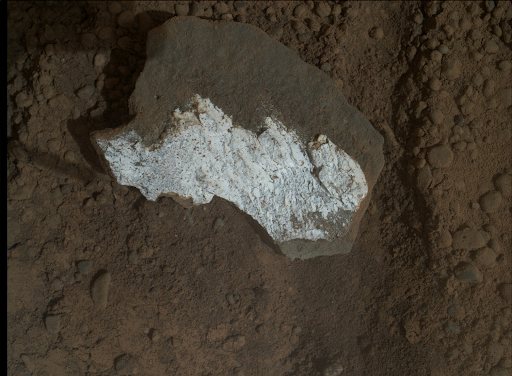
Opportunity sol 3187
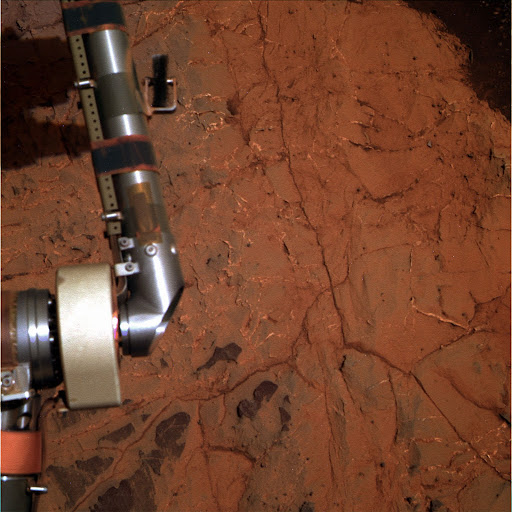
Offline
Like button can go here
#53 2013-01-18 15:44:45
- louis
- Member
- From: UK
- Registered: 2008-03-24
- Posts: 7,208
Re: Color images of Mars from the Spirit and Opportunity rovers
Here is something I saw when it first came out Dec 19th but thought it may be another discarded piece off the rover but after looking at it more I now wish I would have posted it right away. Blogs are now calling it a "Flower." I sharpened Curiosities image a bit and added more contrast and this is what it looks like, note the whitish reflective partially covered rocks above left and below left of it???
What I find amazing is that they wouldn't have done some more investigation of that - whatever it is.
Let's Go to Mars...Google on: Fast Track to Mars blogspot.com
Offline
Like button can go here
#54 2013-01-21 06:52:58
- mars-images
- Banned
- Registered: 2005-09-23
- Posts: 77
- Website
Re: Color images of Mars from the Spirit and Opportunity rovers
louis I agree, they are suppose to be very good with pointing the laser, they should have at least tried that?
Here are some more from Curiosity sol 160 thru sol 162 that may be a little controversial?
Rover exposed chalk

White rock

Chalk

Pearl
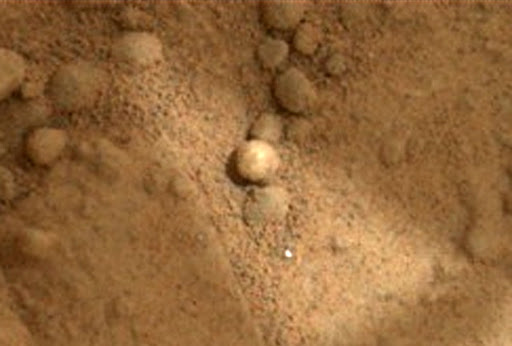
Offline
Like button can go here
#55 2013-01-28 06:41:07
- mars-images
- Banned
- Registered: 2005-09-23
- Posts: 77
- Website
Re: Color images of Mars from the Spirit and Opportunity rovers
One of NASA's little dark secret that if a good scientist or reporter looked deep enough into NASA's information that was already published they will find that Curiosity has organic identifying fluorescents that they used to take this image at night on Mars, a 365 nm light source. This is the right light source to look for organics. The original image of the one below is much more detailed and had hundreds of different dots about 1 pixel wide that is red, yellow and green, something you might identify as organic so those small dots may be either be organic or an artifact? I'm talking about the dots not those verticle streaks you see that are artifacts. Note this orginal image is 4.0 mb 1632 x 1200 pixels??.

The right UV light source to look for organics with Florissant's weren't on any other Martian Lander's or rover's, it was first suggested right after the MER Rover's landed, Phoenix Lander didn't have it either. I have a flashlight black light, UV, that I look for scorpions in my house at night, it is very effective in exposing organic compounds that can be later confirmed with their other instruments. Imagine them finding something crawling around under an upturned rock or in a drilled rock like this.
Here is a link to what a scorpion looks like in a similar UV black light source as Curiosities.
http://www.youtube.com/watch?v=-nXYJRhxoIk
For kicks and giggles, I made a time lapse movie of several different images including the one above at different times of the night, here is what it looks like here:
As you can see unfortunately we didn't make first contact yet...
Last edited by mars-images (2013-01-28 07:48:05)
Offline
Like button can go here
#56 2013-01-28 11:22:27
Re: Color images of Mars from the Spirit and Opportunity rovers
One of NASA's little dark secret that if a good scientist or reporter looked deep enough into NASA's information that was already published they will find that Curiosity has organic identifying fluorescents that they used to take this image at night on Mars, a 365 nm light source. This is the right light source to look for organics. The original image of the one below is much more detailed and had hundreds of different dots about 1 pixel wide that is red, yellow and green, something you might identify as organic so those small dots may be either be organic or an artifact? I'm talking about the dots not those verticle streaks you see that are artifacts. Note this orginal image is 4.0 mb 1632 x 1200 pixels??.
https://lh3.googleusercontent.com/-2Gh9 … 169-11.png
The right UV light source to look for organics with Florissant's weren't on any other Martian Lander's or rover's, it was first suggested right after the MER Rover's landed, Phoenix Lander didn't have it either. I have a flashlight black light, UV, that I look for scorpions in my house at night, it is very effective in exposing organic compounds that can be later confirmed with their other instruments. Imagine them finding something crawling around under an upturned rock or in a drilled rock like this.
Here is a link to what a scorpion looks like in a similar UV black light source as Curiosities.
http://www.youtube.com/watch?v=-nXYJRhxoIk
For kicks and giggles, I made a time lapse movie of several different images including the one above at different times of the night, here is what it looks like here:
http://youtu.be/CrRDQME5dAU
As you can see unfortunately we didn't make first contact yet...
Thanks for that. I hadn't heard that Curiosity had the capability to make detections in the ultraviolet. I had wondered if we could improve our mineral discrimination capability if we used all of optical, infrared, and ultraviolet wavelengths. Do you have a reference for papers written on this?
BTW, how do you get scorpions in your apartment? Not something you see just scurrying around, at least not in my neck of the woods.
Bob Clark
Last edited by RGClark (2013-01-29 05:44:34)
Old Space rule of acquisition (with a nod to Star Trek - the Next Generation):
“Anything worth doing is worth doing for a billion dollars.”
Offline
Like button can go here
#57 2013-01-28 15:13:50
- mars-images
- Banned
- Registered: 2005-09-23
- Posts: 77
- Website
Re: Color images of Mars from the Spirit and Opportunity rovers
Bob Clark wrote "Do you have a reference for papers written on this?,"
Back in the days I remembered that an Oregon research published paper called for using near UV for looking for organics, here is something that came out afterwards that talk about this:
"Study: UV light might find life on Mars,"
"U.S. and British scientists say they have developed a method using ultraviolet light that could identify any organic material present in the soil of Mars."
http://www.upi.com/Science_News/2008/07 … z2JJ3JaWlb
I can't find that original paper, the time was between the MER rovers and the Phoenix Lander Landing on Mars, both rovers and Lander had about 440/ 432 nm light wave not the 365/375 range near uv for florescence for identifying aromatic organic molecules. I did do a quick Google search and found a proposed mission of the EU that says:
"Laser-Induced Fluorescence Emission (L.I.F.E.): searching for Mars organics with a UV-enhanced PanCam.
"The European Space Agency will launch the ExoMars mission in 2016 with a primary goal of surveying the martian subsurface for evidence of organic material. We have recently investigated the utility of including either a 365 nm light-emitting diode or a 375 nm laser light source in the ExoMars rover panoramic camera (PanCam). Such a modification would make it feasible to monitor rover drill cuttings optically for the fluorescence signatures of aromatic organic molecules and map the distribution of polycyclic aromatic hydrocarbons (PAHs) as a function of depth to the 2 m limit of the ExoMars drill."
http://www.ncbi.nlm.nih.gov/pubmed/20041748
The image I shown above by Curiosity is with a white light and a 365 nm wavelength. I live in the desert southwest US where I found one of the most poisonous scorpions in our area taking a shower with me so I ran out and got a black light-emitting diode flashlight. Note, black lights are also good for finding dried up pet soiled carpeting, so if there is life on Mars we may find its waste before we find it. In other words it may be as simple as, to find life on Mars using fluorescence all we have to do is follow the dried up urine trail. Some human urine freezes at below -120 C...
Last edited by mars-images (2013-01-28 20:15:10)
Offline
Like button can go here
#58 2013-01-29 05:46:27
Re: Color images of Mars from the Spirit and Opportunity rovers
Thanks for the interesting links and good luck with the scorps!
Bob Clark
Last edited by RGClark (2013-01-30 04:51:50)
Old Space rule of acquisition (with a nod to Star Trek - the Next Generation):
“Anything worth doing is worth doing for a billion dollars.”
Offline
Like button can go here
#59 2013-01-29 20:18:34
- mars-images
- Banned
- Registered: 2005-09-23
- Posts: 77
- Website
Re: Color images of Mars from the Spirit and Opportunity rovers
Bob Clark your welcome, always glad to help.
Offline
Like button can go here
#60 2013-02-14 18:52:37
- mars-images
- Banned
- Registered: 2005-09-23
- Posts: 77
- Website
Re: Color images of Mars from the Spirit and Opportunity rovers
Curiosity sol 182
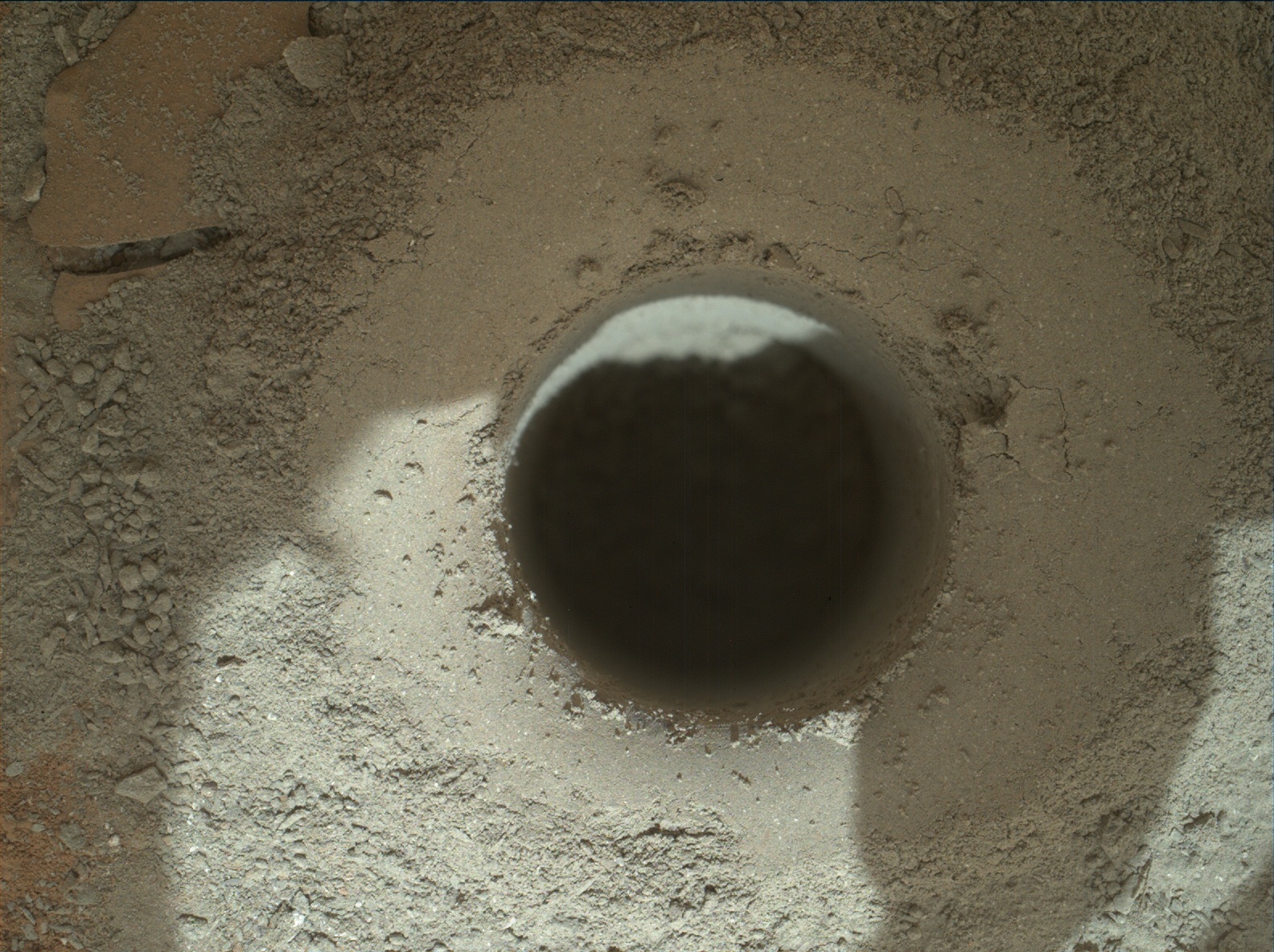
Here is something that the Curiosity science team should consider. The EU are proposing a drill and UV florescence on their next mission to Mars that will shine the florescence light on the drill as they drill. Maybe with some ingenuity Curiosity may have that same advantage. If you take something out of its environment then it will most likely die right away but for a brief moment after you dig it up it is struggling to stay alive. So the drill / florescent will record that brief moment that microbe is alive and moving around. If there is any organics in the material they dug up dead or alive they can first spot it with florescence similar to what they just did in the Antarctica with the first confirmation of microbial life living 2,500 ft below its icy surface...
http://www.popsci.com/science/article/2 … r-pressure
"At the time, the scientists conducted a preliminary test in which DNA-sensitive dye made cells in the sample glow green under a microscope, suggesting life."

"Lake Whillans What six inches of lake looks like half a mile under an Antarctic glacier, it's not much but some call it home. Dr. Alberto Behar, JPL/ASU"
"We have extracted DNA and will be shipping it back to the US for sequencing—-this will tell us who is there and provide us with info on how they make a living," wrote Priscu, in an email to PopSci.
http://www.nature.com/news/lake-drillin … ce-1.12405
"The scientists counted about 1,000 bacteria per millilitre of lake water — roughly one-tenth the abundance of microbes in the oceans. In Petri dishes, the bacteria show a “really good growth rate”, says Priscu."
Last edited by mars-images (2013-02-14 19:17:17)
Offline
Like button can go here
#61 2014-01-24 18:12:37
- mars-images
- Banned
- Registered: 2005-09-23
- Posts: 77
- Website
Re: Color images of Mars from the Spirit and Opportunity rovers
I'm sure there are a lot of people here debating this image, so I thought I would follow the science of how this rock came out of no where to be where it is today? My guess is it is a crushed rock that popped out of one the wheels it was sitting under...
My colorized image from the RGB filter images
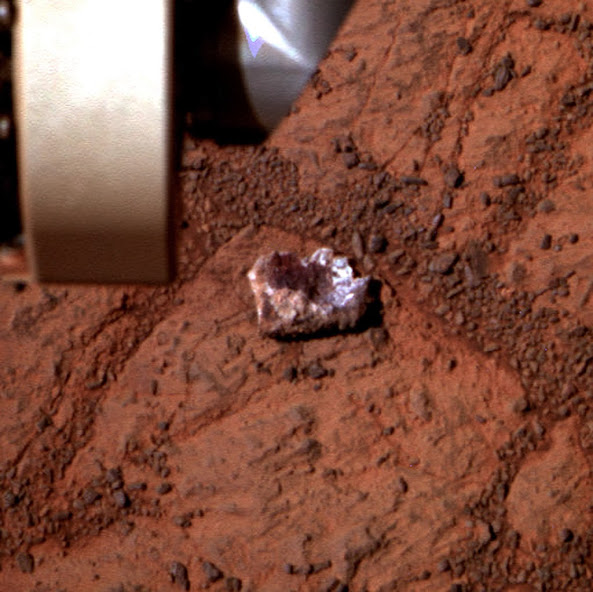
NASA suplied color image

Last edited by mars-images (2014-01-26 17:39:39)
Offline
Like button can go here
#62 2014-01-24 20:25:47
- SpaceNut
- Administrator
- From: New Hampshire
- Registered: 2004-07-22
- Posts: 30,217
Re: Color images of Mars from the Spirit and Opportunity rovers
wheels?
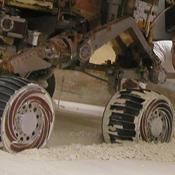
Offline
Like button can go here
#63 2014-01-25 09:59:55
- GW Johnson
- Member
- From: McGregor, Texas USA
- Registered: 2011-12-04
- Posts: 6,122
- Website
Re: Color images of Mars from the Spirit and Opportunity rovers
The two Mars images from NASA in post 61 just above, do not show on my computer. It resolutely will not load them. Doesn't say why.
As for scorpions, their abundance depends upon where you live. I live on rockier high ground in central Texas. We have a lot of them.
I had less when I kept chickens out here on this farm. If you have ever seen a chicken eat a scorpion, you will never again dismiss them as "bird brains".
GW
GW Johnson
McGregor, Texas
"There is nothing as expensive as a dead crew, especially one dead from a bad management decision"
Offline
Like button can go here
#64 2014-01-25 17:55:25
- SpaceNut
- Administrator
- From: New Hampshire
- Registered: 2004-07-22
- Posts: 30,217
Re: Color images of Mars from the Spirit and Opportunity rovers
They are on a private google account and link is not in the jpg format for image posting.
Offline
Like button can go here
#65 2014-01-26 17:22:00
- mars-images
- Banned
- Registered: 2005-09-23
- Posts: 77
- Website
Re: Color images of Mars from the Spirit and Opportunity rovers
Sorry I think I fixed it
Offline
Like button can go here
#66 2014-01-26 17:35:18
- RobertDyck
- Moderator
- From: Winnipeg, Canada
- Registered: 2002-08-20
- Posts: 8,353
- Website
Re: Color images of Mars from the Spirit and Opportunity rovers
As mentioned in another thread, my guess is a salt deposit. Notice how the "rock" is white, with traces of the same colour as surrounding soil. But most importantly, notice how the shape of the rock is exactly the same as the dark doughnut shape in the before image, soil filling a crack in the rock. My guess is salt water rose to the surface, evaporated, it became concentrated wet salt. Osmotic pressure would draw up more salt water; that would evaporate, etc. One member in that other thread suggested it could have been caused by vibration from the rover's wheels. Weight from the rover squeezed out salt water? Again, my basis is that the shape of the rock matches the dark shape in the "before image".
Offline
Like button can go here
#67 2014-01-29 14:12:40
- mars-images
- Banned
- Registered: 2005-09-23
- Posts: 77
- Website
Re: Color images of Mars from the Spirit and Opportunity rovers
RobertDyck said "Salt water rising to the surface"
I made a time lapse images that may show some Sublimation of rock, I'm not sure but this is how I explain it on YouTube "Murray Ridge Pinnacle Island Rock, Questioning if There Were Some Sublimation of Martian Rock From Time Lapse Images (Sol 3540 and Sol 3557) Showing What Appears To Be Some Shrinkage and Missing Mass Inside of Rock at 7 O'clock That Appeared in Front of Opportunity on "Murray Ridge" called "Pinnacle Island"

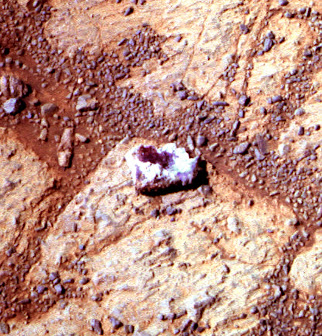
Please note that the two images were taken at slightly different elevations and angles...
Last edited by mars-images (2014-01-29 15:37:01)
Offline
Like button can go here
#68 2023-03-20 07:37:33
- Mars_B4_Moon
- Member
- Registered: 2006-03-23
- Posts: 9,776
Re: Color images of Mars from the Spirit and Opportunity rovers
Stunning Images of Rare Circular Sand Dunes Captured on Mars by NASA's MRO
https://www.guardianmag.us/2023/03/stun … -sand.html
A loving salute to NASA's Mars rover program in 'Good Night Oppy'
https://www.npr.org/2022/11/03/11340953 … night-oppy
Offline
Like button can go here
#69 2023-03-20 14:14:01
- Rxke
- Member
- From: Belgium
- Registered: 2003-11-03
- Posts: 3,669
Re: Color images of Mars from the Spirit and Opportunity rovers
Spirit is still my spirit animal rover...
(the email notification for this post ended up in my spam box, BTW...)
Offline
Like button can go here
#70 2023-03-20 17:53:08
- tahanson43206
- Moderator
- Registered: 2018-04-27
- Posts: 23,876
Re: Color images of Mars from the Spirit and Opportunity rovers
For Rxke and Post #69
Thank you for returned to post once again.... in working with posts from the early days, I have seen many of your posts, and had time to read quite a few of them. It is good to see you back on the board, and if you would be willing to update the community on your adventures over the years, please consider a post or two.
I'll set up a Rxke Postings topic right now, if we don't already have one.
(th)
Offline
Like button can go here
#71 2023-03-20 18:18:06
- SpaceNut
- Administrator
- From: New Hampshire
- Registered: 2004-07-22
- Posts: 30,217
Re: Color images of Mars from the Spirit and Opportunity rovers
Wow, what a shot from the past. I can see a possibility with a *mail account address but; It just so happened that this topic was one of the 40 to which you subscribed to many years ago, as to why you were even tipped off by a post by Mars_B4_Moon shows the forum still is working well.
Welcome back and explore some more.
Offline
Like button can go here
#72 2023-03-20 18:39:56
- tahanson43206
- Moderator
- Registered: 2018-04-27
- Posts: 23,876
Re: Color images of Mars from the Spirit and Opportunity rovers
For SpaceNut re #71
Thank you for explaining what happened there! I have not used that feature, and am glad to know it still works after all this time!
And! Thanks (again) to Mars_B4_Moon for bringing so many of this early topics back into view. The email to Rxke is a surprise benefit of your work!
For SpaceNut re new topic ... please look for a post that would fill Post #2 in the new topic. It is sitting there with no replies.
(th)
Offline
Like button can go here
#73 2023-03-21 02:07:35
- Rxke
- Member
- From: Belgium
- Registered: 2003-11-03
- Posts: 3,669
Re: Color images of Mars from the Spirit and Opportunity rovers
/waves:/
Hey, and hello again, Spacenut!
I does bring back memories!
I'm pretty busy this week so I only glanced at the discussion board, it looks like the way the board now works is now more thematically and/or structured?
I'm still an avid spacelaunch watcher and the youube channel of Mars Guy on ingenuity and perseverance is high on my list of favourite things to watch.
I'll refrain from further littering this thread with my babbling, first I'll have to figure out where to post off-topic stuff like this.
Offline
Like button can go here